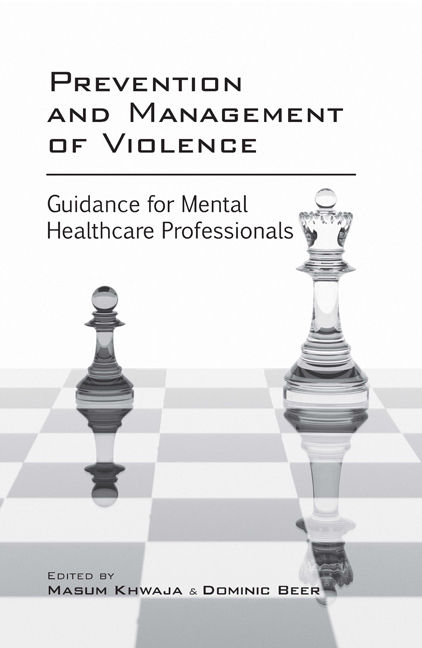Book contents
- Frontmatter
- Dedication
- Contents
- Abbreviations
- List of boxes and tables
- Working group
- Executive summary and recommendations
- 1 Legislation relevant to the management of violence by persons with mental disorders
- 2 Safeguarding vulnerable adults and children exposed to violence
- 3 Risk assessment and management
- 4 Risk prevention and non-pharmacological management of violence in acute settings
- 5 Use of medication and ECT in the management of violence
- 6 Post-incident management
- 7 Management of the risk of violence in the community
- 8 Management of violence in older adults
- 9 Management of violence in people with intellectual disability
- 10 Management of violence in prisons
- 11 Liaison with the police, Crown Prosecution Service and MAPPA
- 12 Information-sharing with victims of crime committed by persons with mental disorders
- 13 Clinical governance
- Appendix Organisations that victims of crime can contact
- Index
13 - Clinical governance
- Frontmatter
- Dedication
- Contents
- Abbreviations
- List of boxes and tables
- Working group
- Executive summary and recommendations
- 1 Legislation relevant to the management of violence by persons with mental disorders
- 2 Safeguarding vulnerable adults and children exposed to violence
- 3 Risk assessment and management
- 4 Risk prevention and non-pharmacological management of violence in acute settings
- 5 Use of medication and ECT in the management of violence
- 6 Post-incident management
- 7 Management of the risk of violence in the community
- 8 Management of violence in older adults
- 9 Management of violence in people with intellectual disability
- 10 Management of violence in prisons
- 11 Liaison with the police, Crown Prosecution Service and MAPPA
- 12 Information-sharing with victims of crime committed by persons with mental disorders
- 13 Clinical governance
- Appendix Organisations that victims of crime can contact
- Index
Summary
By law, all hospitals in England are responsible for making sure that the care and treatment they provide meet government standards of quality and safety (Care Quality Commission, 2013). Through the systematic approach of clinical governance, these standards can be met and developed alongside improving the overall care provided by organisations.
In relation to the management of violence, the core elements of training and education, audit, research and development, openness, risk management and information management can be applied. These include the provision of adequate training in risk management, ensuring processes of recording untoward incidents, transparency in reporting incidents, use of evidencebased management of violence and auditing practice to ensure basic standards are met. Through this fluid, progressive approach, organisations can provide the best quality management of violence in the clinical setting.
Core standards
The Department of Health (2004) has set out common objective standards which apply across all NHS organisations. Among the core standards, a selection is relevant in providing quality management of violence. These are included in the domains of safety, clinical and cost effectiveness, governance, and care environment and amenities.
Safety
Core standard C1 stipulates:
Health care organisations protect patients through systems that
(a) identify and learn from all patient safety incidents and other reportable incidents, and make improvements in practice based on local and national experience and information derived from the analysis of incidents; and
(b) ensure that patient safety notices, alerts and other communications concerning patient safety which require action are acted upon within required time-scales.
Healthcare organisations should therefore have a defined reporting process at a local level. The National Patient Safety Agency provides guidance on the process and standards of data-reporting via the reporting and learning system (National Reporting and Learning Service, 2009). Reported incidents are analysed to identify root causes and likelihood of repetition. Through learning from untoward incidents, the NHS is able to promote patient safety through harnessing learning; it becomes an organisation with a memory (Department of Health, 2001).
- Type
- Chapter
- Information
- Prevention and Management of ViolenceGuidance for Mental Health Professionals, pp. 115 - 119Publisher: Royal College of PsychiatristsFirst published in: 2017



